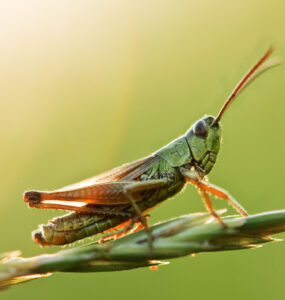Scarlet Lily Beetle
By Rob Sproule
Whether it’s their ease of growth or stunning flowers or just that we’re surprised that such a gorgeous plant can survive here, lilies are many Canadians’ favourite flower. They are the full-throated operatic prima donnas of the perennial garden, and they’re under threat by an unwelcome intruder.
The scarlet lily beetle, alias red lily beetle or lily leaf beetle, is a European native that hitched a ride to Canada on lily bulbs in the mid 1940s. Over the decades, it’s settled westward as far as Alberta.
Identification
Vigilant gardeners (as most lily-lovers are) will first notice brown, sticky frass clumping on the leaves’ undersides. Those same leaves will be entirely chewed up shortly after.
The adult beetles are an unmistakable bright red with black undersides; they look like futuristic plant-eating robots. They can be confused with spotless ladybugs, but they are more narrow and just plain meaner-looking than the beneficial insects.
Life Cycle
Lily beetles spend winter quite comfortably cuddled into your perennial bed soil. After waking up in spring, they don’t take long to start reproducing, with females laying up to 450 eggs per season in batches of a dozen. The yellowish orange eggs hide under lily leaves, usually tucked against the midrib.
The larvae are voracious and spend a few weeks chomping lilies while covered in a pile of their own excrement (if it’s to camouflage as bird droppings, it’s very convincing). Once they’ve eaten their fill of your lilies, they drop to the ground and pupate in a cocoon of dirt and saliva. Enchanting creatures.
Damage
Feasting on all species of lilies and fritillarias (though not daylilies), lily beetles are quickly chewing their way into Canadian gardening infamy. They’re virtuosos at decimating lily collections that have been amassed over decades in record time, devouring leaves, stems, flowers and all.
Control
Although there are plenty of parasitic wasps in Europe to feed on them, lily beetles have no natural enemies in North America. As such, they spread rapidly and will move quickly from ornamental plants to wild lilies, where they can do massive damage.
Before you plant your spring lily bulbs, inspect them for anything suspicious. This is their favourite mode of getting into your yard.
The most effective control is also the most labourious; inspect your lilies regularly, and if you find any lily beetles, pick them off manually. If you can’t stomach crushing them, drop them in a bucket of soapy water.
Sprinkling diatomaceous earth on them will dry them up, but you’ll need to hit the leaves’ undersides to get to the pests.
If you’re persistent (to the tune of every 5 to 7 days), neem oil will kill young larvae. Potent chemicals such as malathion will work, but I recommend that you stay away from them; lilies are a favourite haunt for bees, and strong chemicals could be fatal to them and other beneficial critters in your garden.
Be forewarned that, when threatened, lily beetles will often play dead. As you close in on one with your pincers, expect it drop to the ground, put its legs in the air and wait for you to go away. Squish it anyway. They will also emit a high-pitched squeak as you get close, which can be fairly unnerving.


















